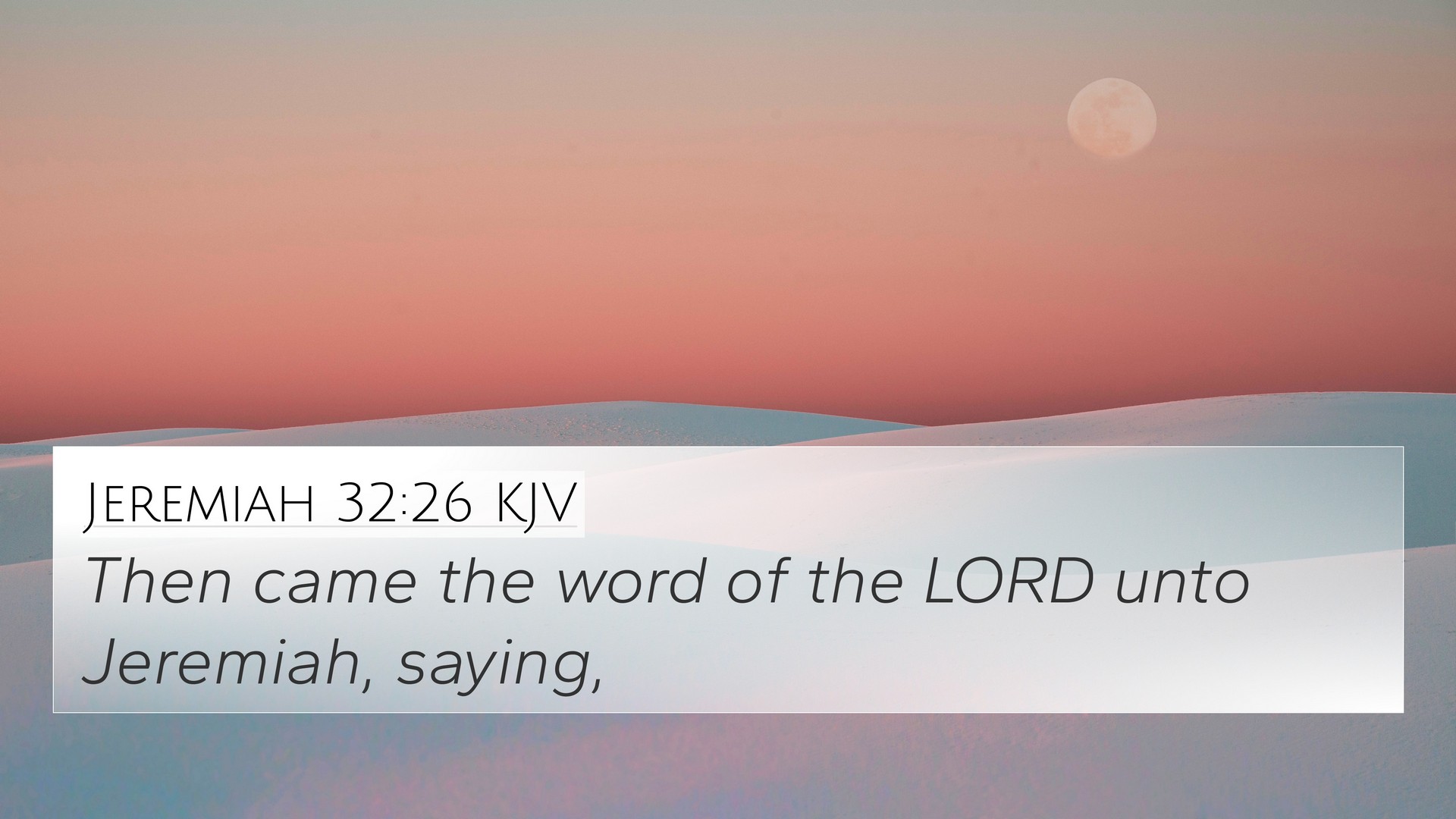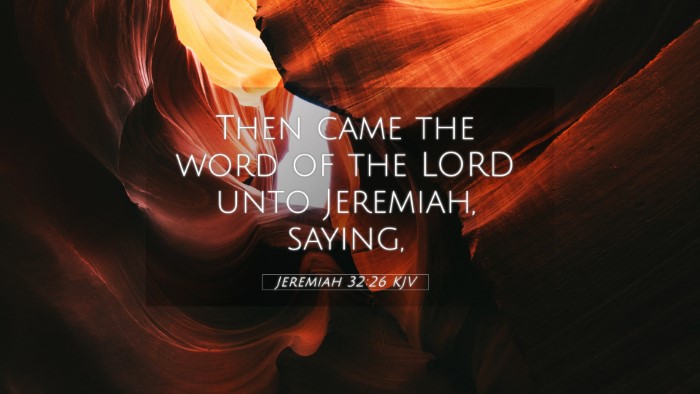Understanding Jeremiah 32:26
In Jeremiah 32:26, we encounter a profound communication from God to Jeremiah, affirming His sovereignty and the certainties of His plans. The verse states:
“Then came the word of the LORD unto Jeremiah, saying,”
Verse Contextual Analysis
This moment in scripture comes at a pivotal time in Jerusalem's history, where God reassures His prophet during a time of impending doom for the nation. Jeremiah, who has witnessed the moral decay and impending destruction of Jerusalem, receives a divine message highlighting God's omnipotence and His ultimate control over human affairs.
Commentary Insights
-
Matthew Henry's Commentary:
Henry emphasizes that God's word to Jeremiah showcases God's unchanging nature and His thorough knowledge of all circumstances. God reassures Jeremiah that, despite the current turmoil, His plans will unfold according to His will.
-
Albert Barnes' Notes:
Barnes interprets this verse as a prelude to God's declaration of judgment and mercy. It reflects the certainty of God’s statements and the communication of His promises, which are vital for understanding God’s character throughout scripture.
-
Adam Clarke's Commentary:
Clarke notes that the phrase “came the word of the LORD” signifies a direct revelation from God, indicating the importance of divine guidance in turbulent times. This serves as a reminder for believers to seek divine direction, especially during challenges.
Bible Verse Cross-References
Jeremiah 32:26 resonates with several other biblical passages that illustrate God’s sovereignty and communication with humanity. Here are some key cross-references:
- Isaiah 55:11: "So shall My word be that goes forth from My mouth; it shall not return to Me void." This reinforces the assurance that God's word accomplishes that which He intends.
- Ezekiel 12:25: "For I am the LORD; I will speak, and the word that I speak will come to pass." This reflects God's commitment to ensure the fulfillment of His prophecies.
- Hebrews 6:17-18: "Thus God, determining to show more abundantly to the heirs of promise the immutability of His counsel, confirmed it by an oath." This underlines God's promise and fidelity to His word.
- 2 Timothy 3:16: "All Scripture is given by inspiration of God and is profitable for doctrine, for reproof, for correction, for instruction in righteousness." This emphasizes the divine origin and authority of all scripture, similar to the message in Jeremiah.
- Proverbs 19:21: "There are many plans in a man's heart, nevertheless, the Lord's counsel—that will stand." This highlights the supremacy of God's will over human intentions.
- Psalm 119:89: "Forever, O LORD, Your word is settled in heaven." This verse assures believers of the eternal truth and reliability of God’s word.
- Jeremiah 1:4-5: "The word of the LORD came to me, saying: 'Before I formed you in the womb I knew you.'" This speaks to the consistency of God’s message through His prophets.
- Romans 4:21: "And being fully convinced that what He had promised He was also able to perform." This aligns with the notion of God's power to fulfill His promises.
- 1 Thessalonians 5:24: "He who calls you is faithful, who also will do it." This reaffirms God's faithfulness in His promises, relating to the assurance given to Jeremiah.
- John 10:27: "My sheep hear My voice, and I know them, and they follow Me." This portrays the intimate communication between God and His people, akin to the divine message Jeremiah receives.
Connections Between Bible Verses
The thematic elements found in Jeremiah 32:26 are crucial for a broader understanding of scriptural truth. These elements link various scriptures and form a tapestry of God's unyielding will, His promises, and the necessity of faith and obedience amongst His people.
- Thematic Bible Verse Connections: The repeated notion of God speaking and revealing His plans showcases a central theme throughout the Bible: God's desire to lead and guide His people.
- Bible Verse Parallels: Each crossed verse serves as a reminder that God’s communication is consistent and reliable; each verse speaks to His character and His faithfulness throughout history.
How to Use Bible Cross-References
Studying cross-references can deepen the understanding of scripture and enhance personal Bible study. Here are a few methods:
- Utilize a Bible Concordance: This tool helps find specific themes or topics related to a Bible verse quickly.
- Engage in Comparative Bible Verse Analysis: Analyze two or more verses to see their interconnections.
- Create a Cross-Reference Guide: Develop your own notes and connections while studying a passage.
- Employ Cross-Referencing Methods: Systematically study subjects using a biblical cross-reference system to identify linked verses across both the Old and New Testament.
Conclusion
Jeremiah 32:26 serves as both a historical testament and a theological foundation for understanding God’s nature. By cross-referencing scripture, readers gain insight into God’s character, enhancing their understanding of His sovereignty, promises, and the profound communication that exists between God and His creation.
The understanding of this verse encapsulates the essence of divine communication, revealing how God's words have consistency and authority throughout the scriptures. By linking this verse with others, believers can better grasp the narrative of God's dealing with humanity across different times and circumstances, reinforcing their faith and understanding of biblical themes.


